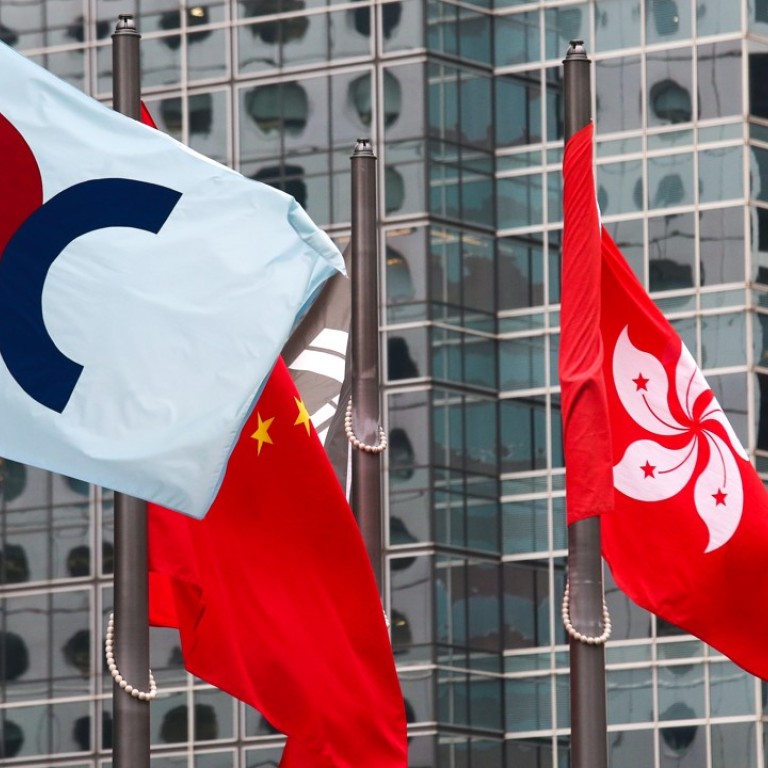
Hong Kong stocks fall to lowest in nearly two weeks as interest rate rise hits property firms
Mainland Chinese stocks also drop as economic data for May comes in below expectations
Hong Kong’s stock market closed at near a two-week low on Thursday after the city’s de facto central bank raised the cost of borrowing, with property stocks among the losers, while mainland Chinese stocks touched a one-year intra-day low after economic data for May came in weaker than expected.
The Hong Kong Monetary Authority raised the base lending rate by 25 basis points to 2.25 per cent, the second increase this year, following a rise in US rates. The HKMA has to follow US rate rises as it seeks to maintain the Hong Kong dollar’s peg to the US currency.
The Hang Seng Index dropped 0.9 per cent, or 284.98 points, at 30,440.17, its lowest level since June 1, while the Hang Seng China Enterprises Index fell 0.7 per cent, or 84.93 points, to 11,950.70.
“Higher interest rates mean higher funding costs and lower investment returns for corporates and equities,” said Louis Wong Wai-kit, director of Phillip Capital Management. “The benchmark index may fall toward the 30,000 support level again.”
Property developers fared poorly on concern that higher borrowing costs could dent the housing market. China Evergrande Group slid 3.2 per cent to HK$22.85, China Resources Land dropped 3.7 per cent to HK$28.95 and Country Garden Holdings fell 1.7 per cent to HK$16.14. Sunac China Holdings lost 1.6 per cent HK$32.40.
Among other leading shares, China Mengniu Dairy dived 4.8 per cent to HK$27.90, the worst-performing blue chip. Insurer AIA Group declined 1.4 per cent to HK$70.15, knocking 38 points off the benchmark index. Food company WH Group lost 3.2 per cent to HK$6.96 and bourse operator Hong Kong Exchanges and Clearing eased 0.8 per cent to HK$255.60.
Smartphone camera lens maker AAC Technologies Holdings fell 1.8 per cent to HK$119.40 and internet giant Tencent Holdings dropped 0.8 per cent to HK$412.
Elsewhere, sporting goods makers fell after Hong Kong-based research firm GMT issued a report on Wednesday questioning the accounting of nine of 16 listed Chinese sports brands based in Fujian province.
Anta Sports Products tumbled 7.9 per cent HK$45.15 after hitting a record high on Wednesday. Li Ning sank 5.9 per cent to HK$9.18, Xtep International Holdings slid 3.8 per cent to HK$5.65 and 361 Degrees International shed 3.1 per cent to HK$2.54.
Online car retailing platform Yixin Group skidded 11.4 per cent to HK$3.95 after reporting a loss of 220 million yuan (US$34.4 million) in the first quarter.
Troubled telecoms equipment maker ZTE dropped 1.1 per cent to HK$14.80 after Goldman Sachs cut its target price for the stock to HK$15 from HK$34, citing future challenges, especially in its businesses in Europe, in the wake of its settlement with the US Bureau of Industry and Security over charges it had breached US sanctions on Iran.
In mainland China, data on retail sales, industrial output and fixed-asset investment for May all missed expectations, while a decision by the People’s Bank of China not to follow the US rate rise surprised markets.
The Shanghai Composite Index recovered some ground to finish 0.2 per cent, or 5.64 points, lower at 3,044.16, after falling to as low as 3,032.406, the weakest level since May 2017. The CSI 300 – which tracks the large caps listed in Shanghai and Shenzhen – slipped 0.4 per cent, or 14.97 points, to 3,773.37.
The Shenzhen Composite Index fell 0.6 per cent, or 9.54 points, to 1,721.89 and the Nasdaq style ChiNext lost 0.7 per cent, or 12.57 points, to 1,673.32.
Retail sales in May expanded at the slowest pace since June 2003, according to Reuters calculations.
May industrial output rose 6.8 per cent from a year earlier, missing analysts’ estimates in a Reuters poll for a rise of 6.9 per cent, while fixed-asset investment growth cooled to 6.1 per cent in the January-May period from a year earlier, the slowest pace since February 1996.

